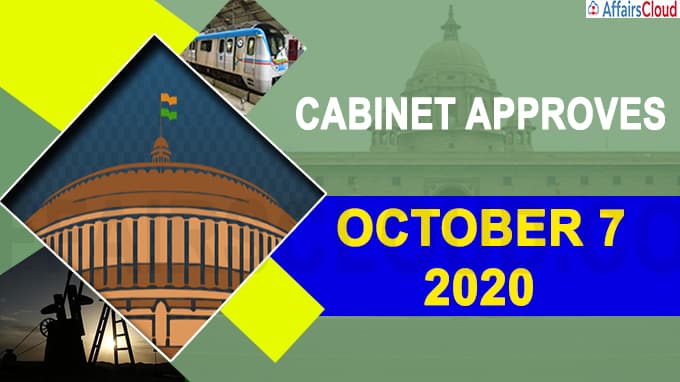 On October 7, 2020, Union Cabinet met and congratulated its chair i.e. Prime Minister Narendra Modi for completing 20 years as a democratically elected leader. He previously served as Chief Minister of Gujarat for three consecutive terms.
On October 7, 2020, Union Cabinet met and congratulated its chair i.e. Prime Minister Narendra Modi for completing 20 years as a democratically elected leader. He previously served as Chief Minister of Gujarat for three consecutive terms.
- During the meet, the Union Cabinet provided approvals to the following proposals which were elaborated by Union Minister Prakash Kehav Javadekar during a media briefing.
–Cabinet Approved to complete Kolkata East -west Metro corridor project at cost of 8,575 cr
The Central Government has approved the revised cost estimates for construction of Kolkata East West Corridor project as per the realigned route. Now the estimated completion cost of the project is Rs. 8575 crore where the Ministry of Railway’s share is Rs.3268.27 crore, Ministry of Housing and Urban Affairs (MoHUA)’ share as Rs.1148.31 crore and Japan International Cooperation Agency (JICA) loan of Rs.4158.40 crore. The target date for completion of the entire project is December, 2021.
About Kolkata East-West Metro Corridor Project:
It is a Rail-based mass rapid Transit system to provide seamless connectivity to Kolkata, Howrah and Salt Lake. It will also integrate all other modes of transport like Metro, Railways and bus transport by constructing efficient and seamless transport interchange hubs.
- Notably the project also envisages construction of 16.6 Km long Metro Railway Corridor including tunnel below river Hooghly which is the 1st transportation tunnel in India under any major river as well as Howrah Station which is one of the deepest Metro stations in India.
–Cabinet approved ‘Natural Gas Marketing Reforms’ to make natural gas price mechanism transparent
As a step towards gas based economy, the Cabinet Committee on Economic Affairs (CCEA) approved “Natural Gas Marketing Reforms” with an objective to formulate a standard procedure for market price discovery of natural gas by gas producers through a transparent and competitive process. In this regard, a standardised e-bidding mechanism will be suggested by Directorate General of Hydrocarbons (DGH).
- This decision has been taken to increase domestic gas production by an additional 40 million standard cubic meters a day (mmscmd), from the current 80 mmscmd.
Key Points:
–The government has already provided for pricing and marketing freedom of gas from blocks awarded under the Discovered Small Field Policy (DSF), Hydrocarbon Exploration and Licensing Policy (HELP) and Coal Bed Methane (CBM) contracts. Now this reform will also grant marketing freedom to the Field Development Plans (FDPs) of those Blocks in which Production Sharing Contracts already provide pricing freedom.
–This policy will help scale up local production from fields of ONGC (Oil and Natural Gas Corporation), Oil India Limited (OIL), Reliance and Vedanta.
–A series of reforms in the Gas sector were made and as a result investment of more than Rs. 70,000 crore is being made in the East coast.
About Directorate General of Hydrocarbons (DGH):
Parent Organization– Ministry of Petroleum & Natural Gas
Director General– SCL DAS
–Cabinet approves MoU between Zoological Survey of India and Canada’s iBOL
The Central Government has approved the Memorandum of Understanding (MoU) signed in June, 2020 between Zoological Survey of India (ZSI), a subordinate organization under Ministry of Environment, Forest and Climate Change and International Barcode of Life (iBOL), a Canadian not-for-profit corporation to further work towards DNA (Deoxyribonucleic acid) barcoding.
- The MoU will enable ZSI to participate at the Global level programmes like Bioscan and Planetary Biodiversity Mission.
What is DNA barcoding?
It is a method of species identification or taxonomic information of unidentified organisms using a short section of DNA from a specific gene or genes
About International Barcode of Life (iBOL):
It is a research alliance involving nations to enable expansion of the global reference database, the development of informatics platforms, and/or the analytical protocols needed to use the reference library to inventory, assess, and describe biodiversity
Scientific Director and Board Chair– Paul Hebert
–Cabinet approves Ratification of 7 Persistent Organic Pollutants listed under Stockholm Convention
The Union Cabinet approved ratification of the Stockholm Convention by banning seven hazardous chemicals that are harmful for health and environment. They are listed as Persistent Organic Pollutants (POPs) under the Stockholm Convention.
- The 7 chemicals are Chlordecone, Hexabromobiphenyl, Hexabromodiphenylether and Heptabromodiphenylether (Commercial octa-BDE), Tetrabromodiphenylether and Pentabromodiphenylether (Commercial penta-BDE), Pentachlorobenzene, Hexabromocyclododecane, and Hexachlorobutadiene.
- The Cabinet has delegated its powers to ratify chemicals under the Stockholm Convention to Union Ministers of External Affairs (MEA) and Environment, Forest and Climate Change (MEFCC) in respect of POPs already regulated under the domestic regulations thereby streamlining the procedure.
What is the Stockholm Convention?
It is a global treaty to protect human health and environment from POPs, which are chemical substances that persist in the environment, bio-accumulate in living organisms, adversely affect human health/ environment and have the property of long-range environmental transport (LRET).
- India had ratified the Stockholm Convention on January 13, 2006.
- In March 2018, Environment Ministry notified the Regulation of Persistent Organic Pollutants Rules under the provisions of Environment (Protection) Act, 1986.
The ratification process would enable India to access Global Environment Facility (GEF) financial resources in updating the National Implementation Plan (NIP).
Cabinet Approval with Foreign Country
–Central Govt approved MoC in the field of Cyber security between India and Japan
Union Cabinet approved signing of Memorandum of Cooperation (MoC) in the field of cybersecurity between India and Japan. It is aimed at enhancing cooperation in emerging technologies, protection of critical infrastructure, cyberspace and to mitigate threats to communication networks.
- It also affirms cooperation in the international arena including in the United Nations (UN).
About Japan:
Capital– Tokyo
Currency– Japanese yen
Prime Minister– Yoshihide Suga
Recent Related News:
i.On August 19, 2020, Union Cabinet has approved the proposal to set up the National Recruitment Agency (NRA) that will conduct a Common Eligibility Test (CET) for non-gazetted posts (Group B and C) of Staff Selection Commission (SSC), the Railway Recruitment Boards (RRBs) and the Institute of Banking Service Personnel (IBPS).
ii.In exercise of the powers conferred by clause (t) of sub-section (1) of section 196 read with section 240 of the Insolvency and Bankruptcy Code, 2016 (31 of 2016), the Insolvency and Bankruptcy Board of India (IBBI) amended the Insolvency and Bankruptcy Board of India (Liquidation Process) Regulations, 2016 by the Insolvency and Bankruptcy Board of India (Liquidation Process) (Third Amendment) Regulations, 2020.




